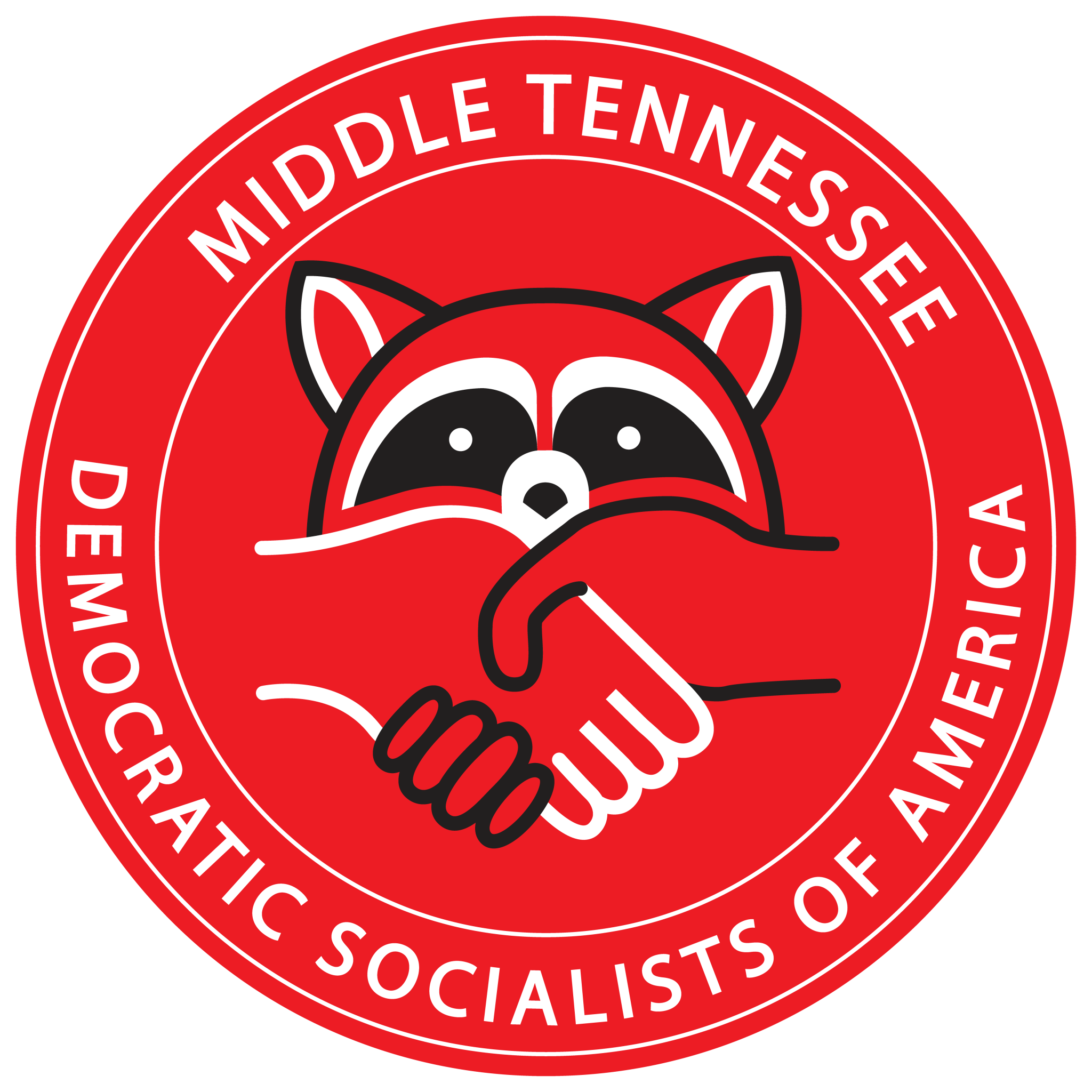

Middle Tennessee chapter of the Democratic Socialists of America endorses “No” vote on the upcoming Nashville Transit proposal.
The Middle Tennessee chapter of the Democratic Socialists of America encourages people to vote “No” on the upcoming Nashville Transit proposal.
Our chapter has voted by the slight majority of 52% to present a unified front opposed to the measure While on principle the chapter is strongly in favor of increased public transit, climate conscious governance, and an increase in union-backed jobs, this plan does not directly or equitably serve the citizens of Nashville that depend on transit the most.
Nashville faces not only a transit crisis, but also a crisis of gentrification and displacement on a monumental scale. Concrete issues such as transit deserts, rising housing costs, dependence on exploitative ridesharing services such as Lyft and Uber, and poor bus coverage all need to be addressed head-on by local government. The unfortunate fact that this transit plan lacks a community benefits agreement addressing any of these issues eliminates the possibility of a principled socialist endorsement.
Our chapter has publicly supported a local working class coalition called the People’s Alliance for Transit, Housing, and Employment (PATHE). We stand in solidarity with their demands which include 31,000 affordable homes by 2025, 24/7 bus service with expanded routes into transit deserts, and guaranteed living wage construction jobs.
Dirty money is heavily involved on both sides of the issue, with reactionary Koch-backed groups fighting the plan and reprehensible actors such as CoreCivic supporting its passage. We seek to distance ourselves from all corrupt interests and focus on the concrete, material impact this particular plan will have on our communities.
While any group that supports the general welfare of the people in Nashville should advocate for increased transit access, this plan serves only to maintain the status quo and accelerate the destructive forces of capitalist development in the area. We urge our members and supporters to vote against the Transit plan on May 1st and to join other working class efforts to create a better, equitable future for Nashville’s transit. This fight does not end when the ballot box closes


Free Brake Light Clinic


List of Committees
The list of current DSA Long Beach committees. The purposes of each will be added in the future.
The post List of Committees appeared first on DSA-LB.


Julien Baker is a queer, Christian, socialist — we had to talk to her




We Stand with Maya Little
North Carolina Piedmont DSA stands with UNC Chapel Hill graduate student worker Maya Little, who was arrested last week for demonstrating the true meaning of UNC’s monument to white supremacy, Silent Sam. By contextualizing this racist statue with red paint and her own blood, Little sent a clear message to UNC’s moderate liberal leadership and reactionary Board of Governors, who have chosen to ignore students and community members, appease neoconfederate and racist groups, and mobilize the police to surveil, infiltrate, and disrupt protesters. Silent Sam must fall.
NCPDSA calls for any judicial or UNC Honor Court charges against Little to be dropped. Fighting against white supremacy is not a crime; it models the utmost honorable character. Additionally, we call for Chancellor Carol Folt to acknowledge the harm her leadership has caused students and the community and to accept responsibility for the racists threats against Little’s life which Folt’s inaction has permitted. Silent Sam must be removed from campus immediately.
– NC Piedmont DSA Steering Committee


Video - See What Colorado Teachers are Asking For


The Carolina Cares Bill Is Completely Inadequate
Carolina Cares (or House Bill 662) purports to close the insurance gap and provide health insurance to those who can’t afford it. Yet the bill fails to address the most pressing healthcare concerns, because it does not go far enough to address North Carolinians’ needs.
Free at the point of service
The bill operates on the same faulty logic as much of the current healthcare system: it assumes that people need to “get their skin in the game” by paying some money for healthcare. If it’s free, the bill’s architects claim, people will abuse the healthcare system.
But people already have their skin in this game: it’s literally their lives on the line. Their taxes also fund government healthcare programs, among other things. But more fundamentally, healthcare is a human right, and our healthcare system should aim to provide care to all even if it was expensive.
Luckily, though, studies have found that “there is little direct evidence suggesting that connecting premium costs to health outcomes...will greatly improve health behavior.” In other words, requiring payment has no benefits for health—just for corporate profits. In truth, studies show that requiring payment simply prevents people from seeking any care, not just expensive care. To improve health outcomes, we must aim for a system that is free at the point of service.
But this bill goes the other direction. As the bill stands, those above 50 percent of the federal poverty line would have to pay 2 percent of their monthly income as coinsurance—a provision that not only fails to help the uninsured, but also adversely affects existing Medicaid beneficiaries.
No work requirement
Carolina Cares also contains an unnecessary, fallacious, and cruel work requirement, stipulating that only those who are “employed or engaged in activities to promote employment” are qualified.
To start, this requirement is just more fine print complicating who can and cannot receive care. Those complications, in turn, place an administrative burden on both providers and consumers.
For consumers, the problems arise when employment structures create payment burdens. Seasonal workers or people who are self-employed may fall out of coverage quickly, because the bill stipulates that your coverage is suspended if you don’t pay premiums for 60 days. It also requires consumers to pay all backed premiums before being reinstated, which could prevent those with lower incomes from ever being able to receive Medicaid again.
On the provider side, the administrative work diverts money that could be spent on patients to paperwork. It’s also unlikely that North Carolina will allocate any additional funds to state Medicaid offices—which are, unsurprisingly, already understaffed—lengthening application and enrollment times and further harming Medicaid users.
On top of that, there are more unemployed people than there are jobs in the majority of North Carolina counties—especially the rural ones. The North Carolina Justice Center reports that there are “nine unemployed workers for every job opening” in Hyde County, for instance. These findings aren’t unusual, either. The number of people who are “choosing” not to work is small. Those who don’t have jobs are retired, disabled, or busy parenting or going to school.
And those who were “out of work” were “more likely to be older (aged 51 to 64 years), more likely to be in fair or poor health, have a chronic mental health condition, or a physical or mental functional limitation,” one expert wrote. “It’s possible that some who report being unable to work might be caught up in new work requirements and lose their coverage. That would be a tragedy, because having a disability or illness likely leaves individuals especially vulnerable to deteriorations in health.”
The work requirement also puts those with criminal records at risk. Those who were formerly incarcerated have well-known difficulties finding employment (not to mention housing and other services). Harming their ability to receive healthcare is simply cruel.
Lastly, according to Andrea Callow from Families USA, work requirements are illegal. Instituting them would violate the Americans with Disabilities Act, as it would disproportionately impact people with disabilities—whether or not they receive disability from the government. Medicare was originally designed as a welfare program to provide insurance; adding a work requirement turns it into a punitive employment program.
Dealing with the underinsured
Medicaid expansion with a work requirement will do nothing to address other fundamental failings of healthcare system.
The first is the number of people who are underinsured with terrible, high-deductible plans that prevent them from receiving any real kind of care. To quote from one paper on Medicare and Medicaid:
“As of late 2016, 28 percent of U.S. adults ages 19 to 64 who were insured all year were underinsured—or an estimated 41 million people. This is more than double the rate in 2003 when the measure was first introduced in the survey, and is up significantly from 23 percent (31 million people) in 2014. Rates climbed across most coverage sources, and, among privately insured, were highest among people with individual market coverage, most of whom have plans through the marketplaces. Half (52%) of underinsured adults reported problems with medical bills or debt and more than two of five (45%) reported not getting needed care because of cost.”
Second is all of the other factors that inhibit people from receiving quality healthcare. Insurance only goes so far, because lack of reliable transportation; lack of disposable income to spend on quality housing and affordable food, exercise options, and other factors in good health; inability to take time off work to go to the doctor; and just finding nearby healthcare providers, especially in rural counties, all present sizable barriers. Current trendy options to reduce those, like wellness programs provided by employers, have not been effective.
Aim higher
Often, Carolina Cares supporters claim that we should support the bill because “it’s the only thing that will pass.” But passing a bad bill that institutes work requirements, expands administrative budgets, and backs bad healthcare logic will not help North Carolinians. We must push back against this slide into the kind of thinking that gave us our current, failing system, and demand something better.
Heather Kim and Ross Gains
NC Piedmont DSA members


Statement in Support of Demilitarize Durham2Palestine
These comments were delivered by NC Piedmont DSA member Jake Stanley at a Durham City Council meeting on April 18.
I am here representing the North Carolina Piedmont chapter of the Democratic Socialists of America, a sponsoring partner of the Demilitarize Durham2Palestine campaign.
As democratic socialists, we believe in government truly by, for, and of the people. We are fighting alongside the groups here today to transform our country so everyone—particularly Black, indigenous, immigrant, LGBTQ, Muslim, and other oppressed communities—can thrive, not merely survive on the scraps of a wildly unequal capitalist system.
Freedom from the fear of state violence is essential to creating that thriving society. But as we have seen in the past decade in the streets of Ferguson, Chicago, and Baltimore, the sidewalks of Staten Island, the neighborhoods of South Sacramento, and countless places in between, Black and Brown people are disproportionately threatened and killed by law enforcement. The militarization of police—municipal and county forces that look more and more like an army—compounds this systemic problem.
We reject the idea that US police, from leadership to officers, have anything to learn from the Israeli military or police, the enforcement arm of a racist apartheid state and violent settler colonial project. We are encouraged by Durham’s efforts to reform the police toward support of and accountability to Durhamites, especially our communities of color, although we agree with Mayor Schewel and the council that there is much more to do.
We want to focus on improving other measures of public safety, like affordable housing and healthcare, strong public education, and a livable wage.
Therefore, we join the call for the Durham City Council to create a new policy that unconditionally bars police training exchanges with Israel or other foreign militaries and police.
Thank you.
Jake Stanley
NC Piedmont DSA member

